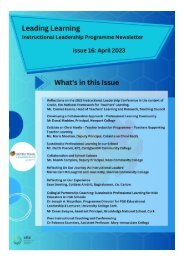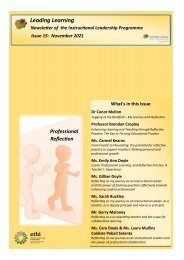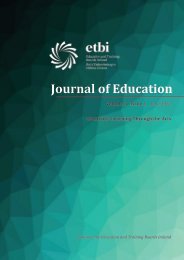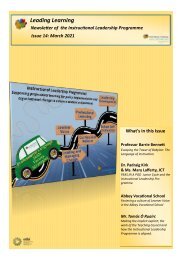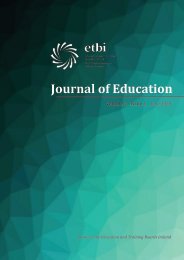ETBI Journal of Education - Vol 2:2 November 2020 (Irish-medium Education)
This bilingual edition of the Journal of Education celebrates Irish-medium Education
This bilingual edition of the Journal of Education celebrates Irish-medium Education
Create successful ePaper yourself
Turn your PDF publications into a flip-book with our unique Google optimized e-Paper software.
<strong>ETBI</strong> <strong>Journal</strong> <strong>of</strong> <strong>Education</strong> <strong>November</strong> <strong>2020</strong><br />
Students with Special <strong>Education</strong> Needs<br />
Learning through <strong>Irish</strong><br />
Dr Sinéad Nic Aindriú, Pr<strong>of</strong>essor Pádraig Ó Duibhir, Dr Joe Travers<br />
Institute <strong>of</strong> <strong>Education</strong>, Dublin City University<br />
OUTLINE<br />
Little research has been conducted on the benefits<br />
<strong>of</strong> immersion education for students with special<br />
educational needs (SEN). Limited international<br />
research suggests that these students can achieve<br />
academic attainments that are comparable to<br />
their peers with SEN who attend schools using<br />
the majority language <strong>of</strong> the community as their<br />
language <strong>of</strong> instruction. This article describes the<br />
perceived benefits associated with <strong>Irish</strong>-<strong>medium</strong><br />
education for students with SEN based on data<br />
collected from interviews conducted with parents,<br />
teachers and principals from <strong>Irish</strong>-<strong>medium</strong><br />
schools in the Republic <strong>of</strong> Ireland and Northern<br />
Ireland (N=34). Recommendations are also made<br />
in terms <strong>of</strong> how <strong>Irish</strong>-<strong>medium</strong> schools can meet<br />
the assessment and language development needs<br />
<strong>of</strong> students with SEN learning through <strong>Irish</strong> as a<br />
second language.<br />
INTRODUCTION<br />
Parents <strong>of</strong>ten worry that they have made the<br />
correct choice by choosing <strong>Irish</strong>-<strong>medium</strong><br />
education for their children with special<br />
educational needs (SEN) (Andrews, <strong>2020</strong>). These<br />
parents are <strong>of</strong>ten advised against bilingualism<br />
and/or immersion education for their children<br />
(Andrews, <strong>2020</strong>). This same advice is also given<br />
internationally by education pr<strong>of</strong>essionals,<br />
IT IS REPORTED THAT IRISH-<br />
MEDIUM SCHOOLS CREATE A<br />
POSITIVE, INCLUSIVE LEARNING<br />
ENVIRONMENT AND THAT<br />
STUDENTS HAVE A HIGH LEVEL<br />
OF SELF-RESPECT AND SELF-<br />
CONFIDENCE AS A RESULT.<br />
with regards to the suitability <strong>of</strong> bilingualism/<br />
immersion education for children with SEN<br />
(Hampton et al., 2017). The rationale given<br />
by these educational pr<strong>of</strong>essionals, such as,<br />
educational psychologists or speech and language<br />
therapists, is that the second language (L2)<br />
might be a source <strong>of</strong> confusion for the child, it<br />
might affect their first language development,<br />
or place an added burden on them. Research<br />
shows that around 9.4% <strong>of</strong> students who attend<br />
<strong>Irish</strong>-<strong>medium</strong> primary schools in the Republic<br />
<strong>of</strong> Ireland have been diagnosed as having a SEN<br />
(Nic Aindriú, Ó Duibhir, Travers, <strong>2020</strong>). Out<br />
<strong>of</strong> these diagnoses, dyslexia, autism spectrum<br />
disorder, dyspraxia, emotional and/or behavioral<br />
difficulties and specific speech and language<br />
disorders are the five categories <strong>of</strong> SEN most<br />
frequently reported.<br />
PAGE 53




